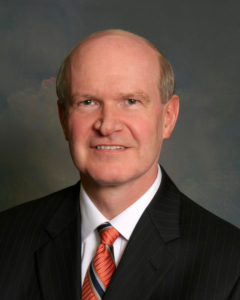The CEO of the $50 billion State Employees’ Credit Union (SECU), Mike Lord retires at the end of this month. His career is noteworthy for two remarkable achievements:
- He successfully navigated 30 years of intellectual contrarianism with Jim Blaine, his boss. Jim’s motto is “often wrong, but never in doubt.” His public name-image-likeness (NIL) brand is an animal of the horse family, but typically smaller than a horse with longer ears and a braying call.

- Against all odds, he sustained and expanded SECU’s exceptional level of leadership and member well-being as Blaine’s successor in 2016.
Succeeding a legend and then taking results to a new level whether in business, coaching a sport, politics or any field of public endeavor, is an incredibly rare event.
“Don’t Mess It Up”
The management consultant Peter Drucker stated, “the most common source of mistakes in management decisions is the emphasis on finding the right answer rather than the right question.”
For Lord and SECU that question has always been how to enhance member service. The mission and vision of the credit union are folksy truisms: “Send Us Your Mama” and “Do the Right Thing.”
When Lord became CEO in 2016 his stated goal was just as straight forward: “Don’t mess it up.”
In today’s individualistic culture that celebrates personal achievement, choosing a leader where the mission supersedes personal ego is a tribute both to the organization’s values as well as the leader’s character. Especially so in the second largest credit union in America.
An example of these values is SECU’s compensation practice. The credit union follows the “Mondragon model” to assure balance among all staff. There are no perks, no bonuses, no incentives and all staff receive the same benefits (health, retirement). This means that SECU CEOs are not paid the multi-million salaries prevalent at many smaller, less complex, less successful CUs.
Focus and Consistency
Several decades ago, SECU’s Board decided to “limit” SECU’s FOM to North Carolina. Those members who moved out of NC or lived in foreign countries could remain, but if they wanted loan services they were referred to a local CU. This focus on the core members who “brung us to the dance,” makes SECU a formidable force against major national banking competitors, several of whom call North Carolina home: Bank of America and Truist.
Today SECU serves 1 in 4 North Carolinians. Rather than trying to be a “national” credit union, its statewide focus has improved economic prospects for individuals and communities that are little more than an afterthought for large competitors.
Sustaining success following the iconic 30-year tenure of Blaine required an underrated leadership trait, consistency, one of Lord’s strengths. While he may have had to go outside of SECU for some expertise, Lord continued to promote from within for employee advancement. Front line staff are much more than transaction providers. Some even receive training in multiple areas of financial service, including tax preparation, life insurance and investment counseling, while earning the appropriate license for each discipline.
Traditional media advertising was shunned. The credit union relied on word of mouth and its foundation’s public philanthropy to keep the SECU name in the press. The funding of scholarships for every local education agency in the state, contributing to teacher housing, new hospice facilities and dozens of other projects projected a “brand” deeply involved in members’ communities.
A Cooperative Financial Conglomerate
Describing SECU as the second largest credit union in the US does not begin to define the scope of its member services. With the credit union at its core, the credit union also oversees the following organizations-CUSO’s:
- SECU Life is the only CU-owned life insurance company in the US. Other CUs which offer insurance do so as an agent for an outside firm;
- A broker dealer and investment advisor that developed a unique partnership with the low-cost Vanguard mutual fund family for members seeking off balance sheet investment options;
- A 501(c)3 Foundation that donates over $15 million per year for community needs in North Carolina;
- A property management company (SECU*RE) that owns and manages 1,500 properties to provide housing, and improve declining neighborhoods, sometimes even selling homes to members. This company is for-profit, taxable and was begun as SECU’s response to the 2009 housing crisis. Its purpose is to reinvest in neighborhoods, prevent bottom fishers from underpaying for foreclosed properties, and provide renters a better choice than local slum lords.
With these multiple business lines come many regulators: NCUA’s ONES and North Carolina’s Credit Union Division of the Department of Commerce, NC Department of Insurance, CFPB, FINRA/SEC, and of course the IRS for the Foundation.
Staying Local While Becoming Larger
With a branch in every county of the state, the credit union’s over 270 locations operate like small credit unions. They provide local employment, knowledge and expertise for every part of the state. Branch managers consult with local advisory boards and often make recommendations for SECU services or foundation grants for their areas.
Lending decisions are all made at the branch level. Branch personnel are intimately familiar with local economic conditions and politics, even in the smallest community. This gives SECU deeper insight into all things economic when making loan decisions and keeps charge-offs way below peer averages.
A Simple Product Profile
The primary purpose of each SECU product is to help members become financially stronger. The credit union’s primary product for helping members build wealth is a variable rate home loan to encourage home ownership. Its loan portfolio is 74% first mortgages.
For over a quarter of a century SECU has made 100% mortgage loans with negligible losses to help lower income and young folks achieve home ownership. Underwriting was based on the common-sense idea that if members pay rent reliably they can be counted on to pay the same amount on a mortgage to own their home. These mortgage loans also invested billions in communities throughout North Carolina’s economy, not just in wealthier big cities.
There is no risk-based loan pricing: each product has a single rate whether a credit card, auto or other lending need. Each loan is based on individual underwriting, not credit scores. SECU’s Salary Advance loan has made billions in payday loans to members at APRs less than 15%. The program, which also has a savings component, fights for-profit payday lenders who prey upon the least advantaged in the economy.
In addition to traditional savings and share drafts, the credit union has $170 million in a 529 college savings plan, $67 million in HSA accounts, and $ 4 billion in IRA/Keogh retirement savings. SECU’s 529 plan is a financial “safer option” for all participants in North Carolina’s college savings program, not just SECU members. That selection says much about the confidence in SECU within the state.
As with loan pricing, there are no savings tiers based on account balances–all 2.6 million members receive the same rate on each product.
Serving the Cooperative System
SECU’s influence extends far beyond its 2.6 million members. Within North Carolina’s cooperative system, the credit union supports others who might reach out for mergers to offer mentoring and resources so they might continue their independent journeys. These operational alliances continue today with Local Government FCU, Latino Community CU, North Carolina Press Association Federal Credit Union and Greater Kinston Community Credit Union.
Greater Kinston is the last survivor of 55 credit unions chartered by the black community during the Jim Crow era when financial services were not open to them. SECU was also a leading fundraiser for the Martin Luther King memorial in Washington, DC.
At a time when many peers proclaim institutional growth as the critical performance objective, not members’ financial well-being, SECU adamantly asserts this is a false dichotomy. Members are the credit union.
As many leaders focus on innovation and the allure of the self-service virtual future, SECU continues the traditional embrace of a face-to-face relationships– for all ages from the newborn to the retiree.
The bedrock of its strategy is the cooperative model with all its inherent design advantages versus other firms. Member-ownership is the unmatchable competitive difference. It implements what writer Ken Wilber calls “good power” in which organizations protect the many who are often at the mercy of the firms they use. He contrasts this “good power” with the instinct of “dominant” organizations that use their position primarily to protect, maintain and promote their success at the expense of others.
SECU proves that size does not dilute cooperative values or purpose. It is a powerful example of the ability to achieve mission and counter the prevailing tendencies of credit unions to become more and more bank-like.
SECU demonstrates that economic, social and political influence can be accomplished by implementing and innovating traditional cooperative principles. Its success validates the credit union system’s contribution for both its members’ financial health and for co-ops as an essential part of the American economy.
Sitting in the Same Place Where He First Began
SECU has been developing system leaders, not only by hiring at the entry level and promoting from within, but also by sending leaders to over 30 other credit unions. Some–Tom Dorety, Terry West, Maurice Smith, and Tom Feindt– ran billion-dollar shops while others migrated to smaller but no less vital firms.
Lord’s career exemplifies this leadership development capacity. In a 2016 interview after becoming CEO, Lord pointed out his office was at the same location where he first began his career 46 years earlier. Albeit in a very different building. Lord’s career exemplifies a critical life lesson, awareness of one’s “true home.”
In a poem called “Little Gidding,” T.S. Eliot ends his quartet by writing:
We shall not cease from exploration
And the end of all our exploring
Will be to arrive where we started
And know the place for the first time.
Lord is the rare exception to Eliot’s observation of human nature. For without exploring, he knew the place he belonged, from the very first time he arrived.


Great article! Thank-you.